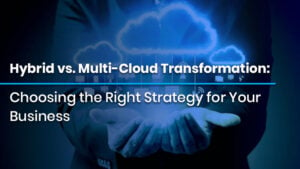
How to Strengthen Security Using CIS Controls and Posture Analysis
How to Strengthen Security Using CIS Controls and Posture Analysis Introduction In the fast-paced and ever-evolving world of cybersecurity, defending digital infrastructure goes far
Master Azure Cloud with IPSpecialist! Gain expert-level skills with our in-depth Azure Courses. Take the next step in your Cloud journey – Start Learning Today!

How to Strengthen Security Using CIS Controls and Posture Analysis Introduction In the fast-paced and ever-evolving world of cybersecurity, defending digital infrastructure goes far

How to Prepare for the AWS Data Engineer Exam Introduction With the world becoming increasingly data-driven, organizations are depending on cloud-based systems to store, process,

Hybrid vs. Multi-Cloud Transformation: Choosing the Right Strategy for Your Business Introduction In the digital-first economy of today, cloud transformation is no longer a
Table of Contents
Have you ever wondered how businesses leveraged Azure in 2023 to redefine their operations, boost efficiency, and stay ahead in the competitive landscape? In this blog, we’ll delve into the realm of Azure, exploring the most used services and products that are setting the standard for cloud utilization. Let’s unravel the intricacies of how Azure is dominating the cloud space and reshaping the digital landscape.
Check Out Our Azure Courses Now!
Azure Virtual Machines (VMs): Azure Virtual Machines streamline the management of virtual desktops, enabling your business to expand its operations without compromising on efficiency or security. They run apps, host websites, and do complex calculations. Whether you need a Windows or Linux environment, these VMs offer flexibility and control, allowing you to configure them based on your specific requirements.
Example: Companies scale their operations using Azure VMs, effortlessly running applications, hosting websites, and performing complex calculations, all while maintaining flexibility and security tailored to their specific needs.
Azure Blob Storage: Ever felt like drowning in data? Blob Storage is your lifeguard. It keeps your unstructured data afloat, making data analysis, backups, and content distribution a walk in the park.
Example: A global media company uses Azure Blob Storage to efficiently distribute vast video content worldwide efficiently efficiently, ensuring seamless streaming for audiences.
Azure Kubernetes Service (AKS): Azure Kubernetes Service takes container orchestration to the next level. It’s designed to simplify deploying, managing, and scaling containerized applications using Kubernetes. AKS automates much of the manual processes involved, allowing you to focus on building and scaling your applications. It’s like having a dedicated manager for your containers, ensuring they run efficiently and reliably.
Example: A software firm automates app deployment and scaling with AKS, allowing teams to focus on coding while AKS manages the underlying infrastructure.
Azure Functions: Why do all the work when you can have Azure Functions do it for you? Whenever you need a task done, you can count on Azure Functions. Whether it’s processing data, responding to events, or doing some background work, Azure Functions manages everything. Azure Functions is your event-driven, serverless compute solution. They let you execute code responding to events without provisioning or managing servers. It’s a pay-as-you-go model, meaning you only pay for the compute resources consumed during the execution of your functions.
Example: Companies leverage Azure Functions to automate various tasks, from data processing to event responses. With a serverless compute solution, they execute code efficiently, paying only for the resources consumed during task execution.
Azure Site Recovery: Ever spilled coffee on your laptop and lost all your important data? Azure Site Recovery is like the ultimate backup. It ensures that your data is safe and sound even if disaster strikes. It enables replication and recovery of virtual machines, ensuring your applications stay available despite unexpected outages.
Example: A financial institution ensures minimal downtime during outages by swiftly recovering systems and data using Azure Site Recovery’s disaster recovery capabilities.
Azure Cosmos DB: Azure Cosmos DB is a globally distributed, multi-model database service. It supports multiple data models (document, key-value, graph, and column-family) and provides automatic and instant scalability. It’s like having a database that can seamlessly scale and adapt to varying workloads across the globe, ensuring low-latency access to your data.
Example: A gaming giant uses Azure Cosmos DB for global low-latency access to game data, ensuring an immersive gaming experience for players everywhere.
Azure Cognitive Services: Have you ever wished for your applications to comprehend and interpret information like a human? Azure Cognitive Services can make that happen. It’s akin to infusing your applications with human-like intelligence, allowing them to understand and interpret data more effectively.
Example: Healthcare providers leverage Azure Cognitive Services for improved diagnostics, analyzing patient data and medical images for precise decision-making.
Azure DevOps: The ultimate collaboration tool for developers. It’s not just about writing code; it’s about shipping excellent software. Azure DevOps streamlines the whole process, making collaboration a piece of cake.
Example: Development teams streamline collaboration and software delivery with Azure DevOps, managing code, builds, and project workflows efficiently.
Azure Machine Learning: Azure Machine Learning acts as a predictive tool, enabling you to foresee future data trends. This capability empowers you to make informed decisions, stay ahead of the curve, and maintain a strategic advantage.
Example: A retail company forecasts customer demand using Azure ML, optimizing inventory and minimizing shortages for maximum sales.
Azure Sentinel: As the guardian of your digital environment, Azure Sentinel assumes the role of a security protector. It actively identifies and responds to threats in real time, serving as a digital fortress for your data. This means you have a robust defense system in place, ensuring the protection and integrity of your digital assets.
Example: A cybersecurity firm employs Azure Sentinel for real-time threat detection and response, safeguarding networks and ensuring data integrity for clients.
Azure emerges as a versatile toolset that stretches beyond the ordinary confines. It’s not just about running applications and storing data; Azure operates as the conductor overseeing the synchronized execution of computing, storage, networking, analytics, and management processes.
Azure isn’t merely a platform; it’s a comprehensive digital ecosystem that transforms the ordinary into the extraordinary. The suite of Azure tools isn’t just a collection; it’s a dynamic ensemble introducing flexibility, cost-efficiency, and top-tier security. Azure caters to a spectrum of needs, embodying the essence of cloud excellence in a concise yet expansive package.
Azure sets the standard for cloud utilization in several ways.
Azure’s robust performance in Q4 2023, holding over 30% of the cloud market, owes itself to key factors. Microsoft’s emphasis on enterprise clientele distinguishes Azure, offering Office 365, Dynamics 365, and Azure Active Directory, enticing businesses seeking modernization. Azure’s flexibility for hybrid cloud setups also caters to those hesitant to migrate workloads fully. Azure’s AI and ML services, like Cognitive Services and Data Lake Analytics are coveted for data-driven insights and innovation. With its enterprise focus, hybrid adaptability, and cutting-edge AI/ML tools, Azure is poised for continued dominance in the cloud computing sphere. This success underscores Microsoft’s dedication to addressing diverse business needs and fostering technological advancement.
Businesses will increasingly leverage Azure in 2024 to gain a competitive edge and achieve digital transformation goals. Azure’s comprehensive suite of cloud computing services, encompassing infrastructure, data storage and analytics, application development, and security, empowers businesses to innovate and modernize their operations.
Concluding our exploration in a technology-driven world, Azure isn’t merely a participant; it’s the transformative force. The remarkable Azure services and products in 2023 have turned businesses into digital leaders. In the ever-evolving digital landscape, Azure is a beacon of innovation, guiding businesses and organizations towards a future with limitless possibilities. It serves as a steadfast North Star, illuminating the path toward achieving ambitious goals and transforming dreams into reality.
With Azure, we’re not just talking about the future; we’re actively shaping it. Azure is more than just a service; it’s a revolutionary catalyst transforming digital aspirations into reality.
© 2025 All rights reserved | Privacy Policy | Terms and Conditions | Sitemap | Cookie Policy




